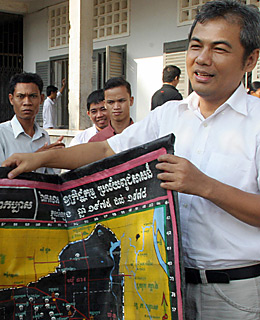
Youk Chhang
"Cambodia is like broken glass," says Youk Chhang, director of the Documentation Center of Cambodia. "Without justice, we cannot put the pieces together." Putting the pieces together is the mission of the man who made himself the keeper of Cambodia's darkest memories.
Standing up to powerful forces that feared reopening the past, Chhang has documented the three years, eight months and 20 days of cruelty that claimed the lives of 1.7 million Cambodians under Pol Pot's genocidal Khmer Rouge. Six hundred thousand pages of documents, maps of 20,000 mass graves and 4,000 transcribed interviews with former Khmer Rouge soldiers are testimony to Chhang's conviction that there is no future without making peace with the past. They will provide the evidence at a long-delayed tribunal on the genocide, which it is hoped will finally start this year.
Confronting painful history is never easy. But for Chhang, 46, it is personal. Under Pol Pot, his sister was accused of stealing rice. A soldier slashed open her stomach to prove her guilt. Her stomach was empty. She died a slow and horrible death. This is one of the unspeakable acts that have gone not only unpunished but unexplained.
The tribunal will allow the world to hear the architects of these crimes speak about why they inflicted such suffering. In pain revisited, there will be a chance for a nation's healingand in Youk Chhang, a hero confronting the past's villains.
Senator Kerry brokered the U.N.'s Cambodian-genocide tribunal